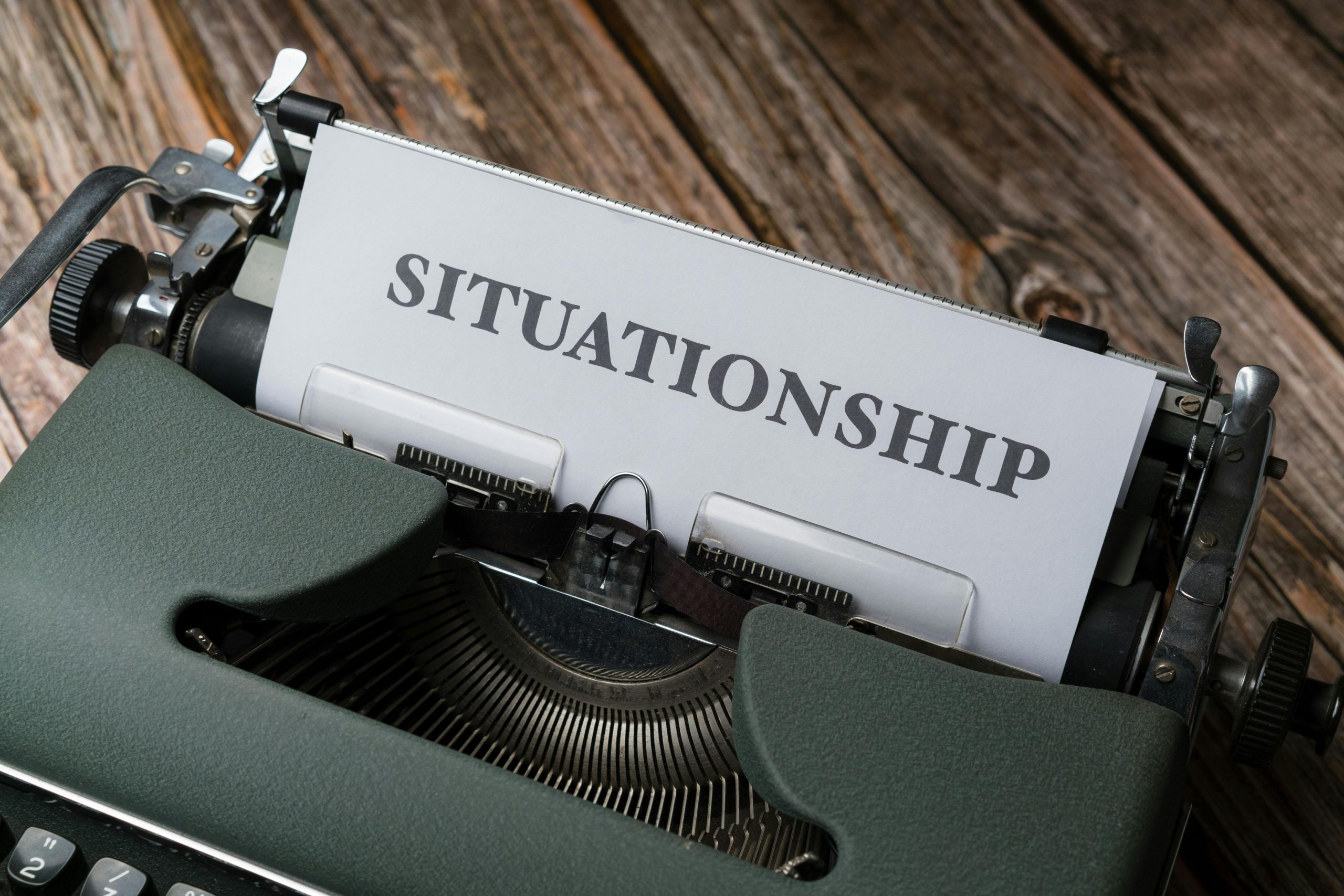Ever feel like you’re stuck in a situationship but not sure if it’s something more? You’re not alone. Lots of people end up in “relationship limbo”—uncertain, maybe hopeful, but also a little lost. When things aren’t defined, you can find yourself second-guessing every move.
It’s easy to see why so many get comfortable in the in-between. Labels feel heavy. But the truth is, staying unclear for too long can leave you feeling drained, confused or even hurt. This post will lay out clear signs you’re not in a real relationship—and show you how to move forward with more confidence.
Defining Situationships and Relationships
Knowing where you stand with someone can shape your confidence and happiness. The words “situationship” and “relationship” get thrown around a lot, yet their differences can feel fuzzy. Here’s how to spot what’s what and understand the real gaps between them.
What is a Situationship?
A situationship is something between friendship and a committed relationship. It’s casual, undefined, and can be surprisingly confusing. You might talk all the time, spend nights together, and feel the early comfort of dating—but neither of you talks about the future. There’s often no clear talk of being exclusive or official.
Some signs you’re in a situationship:
- No label or title: You don’t call each other boyfriend, girlfriend, or partner.
- Unclear boundaries: You’re not sure if seeing other people is “allowed.”
- Mixed signals: Affection is there, but plans for the future aren’t.
- Plans are last minute: Hanging out happens when it’s convenient, not planned.
It can feel safe because it’s light and pressure-free. But the blurry lines lead to confusion, second-guessing, and sometimes loneliness.

Photo by Ron Lach
What is a Relationship?
A relationship, on the other hand, is about clarity and commitment. People in strong relationships talk openly about expectations, exclusivity, and their future. There’s a shared understanding of “us.” This doesn’t have to mean wedding bells or grand promises, but it does mean both people know where they stand.
Key signs of a real relationship:
- You’re exclusive: Both of you agree not to date others.
- Talk about the future: Conversations about upcoming events, trips, or even meeting families happen naturally.
- Open communication: You feel comfortable discussing feelings, worries, and needs.
- Consistency: Time together is planned, not just when it’s easy for one of you.
- Friends and family are in the loop: Your partner knows the other people in your life.
Relationships have their challenges, but the comfort of knowing “what are we?” is answered makes all the difference.
The Gray Zone: Why It Feels So Blurry
The line between a situationship and a relationship isn’t always obvious. Feelings can be strong, habits can look like a couple’s routine, but the definition is missing. Without talking about roles and hopes, it’s easy to get stuck in a fog.
- People avoid labels to dodge pressure or fear of rejection.
- Sometimes, both want different things but are afraid to admit it.
- Social media makes “low-key” and casual situations more common.
If labels make you uneasy, that’s normal. But knowing what you want and what you’re actually in can save you from months (or years) in limbo.
7 Signs You’re Stuck in Dating Limbo
Modern dating can feel like a riddle—especially when you can’t tell if you’re in a relationship or just drifting. If things feel cloudy, you’re not alone. So, how do you know if you’re sitting in situationship limbo? Watch for these seven red flags that often show you’re stuck in between, no matter how strong the chemistry may seem.

Photo by Markus Winkler
1. You Avoid Defining “What You Are”
If every time the talk about your status comes up, it gets dodged or brushed off, that’s a classic sign of limbo. Some people skirt around “the talk” because they fear pressure or losing what they have. But going weeks or months with no clear answer about your label leads to second-guessing and insecurity. When “What are we?” feels off-limits or turns into a joke, it’s a strong hint you’re not on the same page.
2. Your Communication Comes and Goes
Consistent, honest communication is key in healthy relationships. If texts, calls, or hangouts seem to follow a pattern of hot then cold, you could be in limbo. Maybe you talk every day for a week, then get radio silence for days. You shouldn’t feel like you’re chasing someone or always waiting for their next reply. Choppy communication often means nobody knows where they stand.
3. You Don’t Make Future Plans Together
Talking about the upcoming weekend or a future event is natural for couples. In situationships, future planning rarely makes the cut. Your dates happen last-minute. Vacations, birthdays, even small things like tickets to a show? Not discussed or quickly dismissed. Time together is lived day-by-day, and beyond that, nothing is certain. If your calendar never fills with plans as a pair, it’s a sign you might be drifting instead of building.
4. You Keep Things Secret or Low-Key
Relationships often become part of your day-to-day life. If you notice you haven’t met each other’s friends or family, or you avoid posting photos together, ask yourself why. When things stay in the shadows, it can be a comfort zone for someone not ready to commit. You deserve to feel proud of your connection—not like you’re hiding it.
5. You Do Most of the Emotional Work
Emotional energy should be balanced. If you’re always the one checking in, planning meetups, or keeping the conversation deep, it can feel draining. Maybe you swallow your feelings so you don’t rock the boat, or you comfort them when they’re down but rarely get the same in return. Real relationships have give-and-take. If the load is always on your shoulders, something is off.
6. You Often Feel Confused or Uncertain
Stable relationships might have problems, but you shouldn’t feel lost about where you stand. If you catch yourself guessing what’s next, feeling anxious about sending a text, or re-reading your chats to find hints, you’re likely not getting the clarity you need. A healthy relationship usually provides the security of knowing you matter.
7. Things Stay Shallow, Not Deep
Deep connection takes time and effort. If your conversations rarely go beyond jokes, surface-level updates, or flirty texts, you’re missing out on intimacy. Maybe you talk all night—but never share real goals, fears, or dreams. True relationships grow deeper as both people open up. If things never leave the shallow end, ask if you’re both interested in more or just floating along.
These signs don’t mean you’ve failed, just that it might be time to look closer at what you want out of dating—and whether your connection is giving you that right now.
Why People Stay in Situationships
Being in dating limbo often feels safer than facing the unknown. Even the most independent people can find themselves holding onto a situationship, even as doubts and worries creep in. If you’ve ever questioned why you keep hanging on, you’re not alone. Plenty of people get stuck for surprisingly simple, very human reasons.

Photo by David Garrison
Fear of Being Alone
Lots of people stay in situationships because being alone feels scarier than being stuck. The idea of starting over, facing the dating world or even just sitting with your own thoughts can seem worse than a lukewarm connection.
- Loneliness is hard, even when you’re used to it.
- Some people grew up thinking partnership is a must for happiness.
- The comfort of having “someone” sometimes wins over the risk of having no one.
This isn’t weakness or desperation. It’s normal to crave connection, even when that connection isn’t perfect.
Mixed Signals and Hope
Situationships thrive on mixed signals. When things are good, it’s easy to latch onto those bright moments and convince yourself real change is right around the corner.
- That thoughtful text, sweet date or random surprise can feel like proof things will get better.
- When someone keeps you guessing, the little highs feel more intense.
- You might replay good memories, hoping next week will finally bring clarity.
Hope isn’t foolish. It’s how most of us get through rough patches. But holding tight to hope for too long can create more confusion than comfort.
Comfort and Familiarity
Stability matters. Even if a situationship isn’t moving forward, it often brings a kind of routine. That can be hard to give up—especially if you’ve invested time and energy or built habits around this person.
- Daily texts, inside jokes, or someone to vent to after work build a sense of comfort.
- Change is hard, even change you know you need.
- Starting over feels exhausting when you’ve put months or years into a connection.
Familiar routines act like a cozy blanket, making it tough to walk away even when you know you’re not fully satisfied.
Hoping They’ll Change
Many people stick around, telling themselves this is just a phase. It’s common to believe things might become clear or the other person will finally want more.
- You remember times when it felt almost like a “real” relationship.
- They might even promise to talk about it “soon” or seem close to taking things further.
- Sometimes, it’s easier to believe change is coming than accept it may never happen.
This hope isn’t silly or uncommon, but it can keep you tethered to a cycle of waiting.
Avoiding Hard Conversations
Bringing up the “what are we?” talk is tough. Some stay quiet to avoid hurting the other person’s feelings or starting an argument.
- Speaking up means risking rejection or awkwardness.
- You might worry about ruining what you have, even if it’s incomplete.
- Avoiding the topic makes it easier to pretend things are fine.
Often, not speaking up means the waters stay muddy. This avoids short-term discomfort but can hurt more in the long run.
Normal but Not Always Healthy
It’s important to remember you’re not alone, and you’re not broken for hanging on. Situationships lure people in because they offer warmth, hope, and comfort—even if those things come with a cost. But clinging to confusion often takes a toll, leaving you drained, insecure or doubting yourself. Holding out for change sometimes leads to more heartache than moving forward.
How to Move On From Limbo and Find Clarity
Getting stuck in relationship limbo drains your energy, confidence, and peace of mind. If you keep hoping things will change, or feel confused about where you stand, it’s time to take action. You don’t need to stay in the fog. Finding clarity often starts from within. Let’s break down how to set boundaries, ask for what you need, and finally step out of limbo.
Get Real About What You Want
You deserve to know what you need and want, even if it feels scary to admit. Take a quiet moment to check in with yourself.
- Write down what’s missing for you right now.
- List your non-negotiables in dating (like respect or clear plans).
- Picture your ideal connection. Does your current “almost-relationship” fit?
Being honest with yourself is the first step. If you want more, it’s OK to say so—even just to yourself.
Set Boundaries That Protect Your Time and Heart
Clear boundaries are like guardrails for your emotions. They protect your heart before mixed signals can wear you down.
Here are some simple ways to set boundaries:
- Limit last-minute plans if that’s hurting you.
- Decide not to text first every time.
- Tell yourself it’s okay to turn down things that make you uneasy.
Script to try:
“I’ve noticed I keep saying yes to things I’m not comfortable with. I care about you, but I need to slow down and only do what feels right for me.”
Boundaries are not walls. They’re acts of self-care. Sticking to them makes it clear that your needs matter too.
Ask Directly for Clarity
You don’t have to wait for the other person to bring up “the talk.” Want out of limbo? Start the conversation.
Tips for a low-pressure but clear talk:
- Pick a relaxed setting, not mid-argument.
- Use “I” statements so no one feels attacked.
- Be ready for any answer, even one you don’t want.
Sample prompts:
- “I like what we have, but I feel unsure sometimes. Where do you see this going?”
- “I want to be honest with you. I’m looking for something real—what about you?”
The goal isn’t to force labels but to get real answers. If someone avoids the topic over and over, you have your answer.
Address Your Needs Without Apology
You’re allowed to have needs. Say them with confidence—without watering down or apologizing.
- “It’s important for me to know if we’re exclusive.”
- “I want someone who wants to make plans for the future, even small ones.”
- “Consistency matters to me.”
If these feel too blunt, pair them with kindness:
“I care about you and enjoy our time. I need more clarity so I can feel secure, is that possible?”
Decide What Happens Next
Clarity is a gift, even if you don’t get the answer you hoped for. If you find out they’re not ready, that’s useful information. If your needs are met with excuses, it’s a sign to pull back or walk away.
Consider these options:
- If they want the same things, work together on next steps.
- If they’re unsure or keep dodging, give yourself permission to move on.
- If your needs cause conflict, know that staying will probably hurt more long-term.
You don’t need to stay stuck because you’re afraid to lose something “okay.” Walking away makes room for real connection.

Photo by juliane Monari
Remind Yourself: You’re Not Asking Too Much
Wanting a clear answer, steady plans, or basic respect isn’t “demanding”—it’s healthy. If someone can’t give you that, you’re not asking for the wrong things. You’re asking the wrong person. Letting go of limbo is how you open the door to real love, and get your emotional energy back.
Conclusion
You don’t have to stay lost in the gray area of a situationship. Making room for honesty and clear connection can lift a huge weight from your shoulders. You deserve a relationship where you feel seen, valued, and sure of where you stand.
Choosing clarity will give you more peace, strength, and room for real happiness. If limbo has left you tired, take this as your sign to ask for more. Thanks for reading—if this post spoke to you, share your story or thoughts below. You never know who you might help just by speaking up.